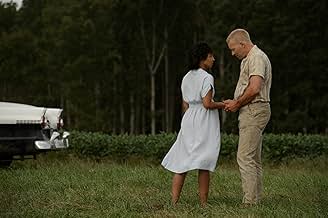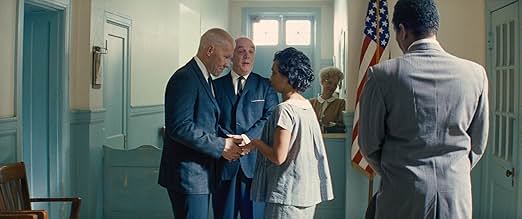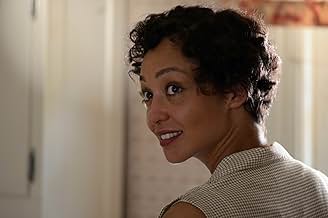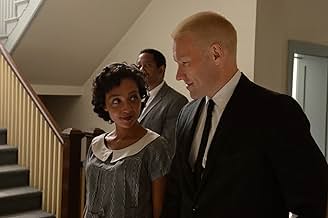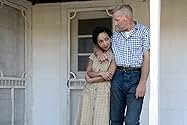VALUTAZIONE IMDb
7,0/10
38.049
LA TUA VALUTAZIONE
La storia di Richard e Mildred Loving, una coppia il cui arresto per matrimonio interraziale nella Virginia degli anni '60 scatena una battaglia legale che avrà termine con la sentenza stori... Leggi tuttoLa storia di Richard e Mildred Loving, una coppia il cui arresto per matrimonio interraziale nella Virginia degli anni '60 scatena una battaglia legale che avrà termine con la sentenza storica della Corte Suprema del 1967.La storia di Richard e Mildred Loving, una coppia il cui arresto per matrimonio interraziale nella Virginia degli anni '60 scatena una battaglia legale che avrà termine con la sentenza storica della Corte Suprema del 1967.
- Candidato a 1 Oscar
- 25 vittorie e 91 candidature totali
Chris Greene
- Percy
- (as Chris R. Greene)
Recensioni in evidenza
Loving Review
Jeff Nicolas newest film centres around the true story of Richard and Mildred Richard, the couple that fought the supreme court to legalize interracial marriage. On the surface this story seems interesting but over done but the way Jeff Nicolas tells this story makes it incredibly unique. Instead of focusing on the big story about Civil Rights Nicolas focuses on the very personal story of Richard and Mildred. By bringing the story down to a very personal scale Nicolas told the story in a far more impacting and effective way. This movie isn't about a revolution or a grand battle this is truly a movie about two people being in love. The movie doesn't try to rant or preach it just tries to tell a human story. Ruth Negga shone in this movie. She gave an honest, and emotional performance that really made Mildred seem like a person instead of just a character. Acting against her or more accurately with her is Joel Egerton. The character of Richard is fall less emotional so therefor Joel has less opportunities to show off, instead Joel utilized the quiet moments with his character to give a strong performance. Together the pair creates a believable, balanced relationship that shows us they're in love instead of just telling us. The accents at first are distracting and can be hard to understand but as the movie continues the audience becomes more immersed in the world and it feels natural. The major issue with the movie is its repetition. Due to the nature of the story the movie hits similar points multiple times, by condensing the events the movie could have been more efficient.The movies greatest strength is it's characters. The characters never feel like roles in a movie, instead they feel like actual people. The movie shows us small yet very personal moments between the characters that really make them come to life. From simple glances to quiet laughs you really believe that these are humans with thoughts, feelings and emotion. Tis makes the audience care much more about their story and therefore become more invested in the movie. The soundtrack much like the movie is quiet yet effective. It gives the film a very distinct optimism to it. The camera work is gorgeous. It's ability to focus on details then go to sweeping landscape shots is very impressive.
Jeff Nicolas newest film centres around the true story of Richard and Mildred Richard, the couple that fought the supreme court to legalize interracial marriage. On the surface this story seems interesting but over done but the way Jeff Nicolas tells this story makes it incredibly unique. Instead of focusing on the big story about Civil Rights Nicolas focuses on the very personal story of Richard and Mildred. By bringing the story down to a very personal scale Nicolas told the story in a far more impacting and effective way. This movie isn't about a revolution or a grand battle this is truly a movie about two people being in love. The movie doesn't try to rant or preach it just tries to tell a human story. Ruth Negga shone in this movie. She gave an honest, and emotional performance that really made Mildred seem like a person instead of just a character. Acting against her or more accurately with her is Joel Egerton. The character of Richard is fall less emotional so therefor Joel has less opportunities to show off, instead Joel utilized the quiet moments with his character to give a strong performance. Together the pair creates a believable, balanced relationship that shows us they're in love instead of just telling us. The accents at first are distracting and can be hard to understand but as the movie continues the audience becomes more immersed in the world and it feels natural. The major issue with the movie is its repetition. Due to the nature of the story the movie hits similar points multiple times, by condensing the events the movie could have been more efficient.The movies greatest strength is it's characters. The characters never feel like roles in a movie, instead they feel like actual people. The movie shows us small yet very personal moments between the characters that really make them come to life. From simple glances to quiet laughs you really believe that these are humans with thoughts, feelings and emotion. Tis makes the audience care much more about their story and therefore become more invested in the movie. The soundtrack much like the movie is quiet yet effective. It gives the film a very distinct optimism to it. The camera work is gorgeous. It's ability to focus on details then go to sweeping landscape shots is very impressive.
I'm very conflicted on how I feel about this. On one hand, I very much appreciated just how restrained and quiet this film turned out to be. It could have easily turned into a completely sentimental, over-saturated melodrama in the vein of The Help and it didn't. However, I also feel like it could have been more effective than it was. It also very much felt like Nichols was kind of on stand-by. I'm not sure if it was the mix of the period drama subject matter with someone like him as a director that made it feel a lot quieter than most films of this type, but I wanted to feel more than I did, I wanted more passion out of it. It's still a solid film and I'll see how it fares in my mind with time, but for now I say it was somewhat of a disappointment. I do think quieter films like this fare better with me the more I think about it, so I'm hopeful I'll like it a little more later on. Both Edgerton and Negga were really lovely, but I really don't see them getting nominated for an Oscar. I just think if a film is like this, the AMPAS will want something "bigger", both by the film and its actors and I just think in general everything here is way too subdued for them. It was great seeing Negga in a role so unlike her other one in Preacher and I can't wait to see more of her.
A few weeks ago when I reviewed "Hidden Figures" I pointed out the how absurd the racist behaviour at NASA in the 60's must have appeared to a young boy in the audience at my screening. In many ways, "Loving" – a film that has had a lot less publicity and is a less obvious 'crowd-pleaser' – makes a useful companion piece to that film.
It tells the true story (yes, yet ANOTHER 'true story'!) of Richard and Mildred Loving who travelled from their home town of Central Point Virginia to Washington DC where – as a mixed race couple – they could legally get married.
However, on returning to their home state and living together as man and wife, they fell foul of the State's repulsive antimiscegenation statute which banned inter-racial marriages. The Lovings were found guilty and sentenced to a year in jail, which was suspended on the requirement that – unbelievable but true – the couple leave Virginia and not return (together) for 25 years. The film documents the fight of the couple – largely led by the feisty Mildred (Ruth Negga) – to fight the injustice, taking the case ultimately to the US Supreme Court for an historic ruling.
This was an Oscar-nominated performance by Ruth Negga and, man, is it deserved. It's a performance of such quiet understated power that it is a joy to watch. But also strong is that of Joel Egerton ("Midnight Special", "The Great Gatsby") as Richard who here adopts a largely sulky and subservient manner that contrasts beautifully with Negga's perky optimism.
I also loved the performance of Marton Csokas (Celeborn from "The Lord of the Rings"), chillingly unreasonable as the bigoted Sheriff Brooks and Michael Shannon ("Nocturnal Animals", "Midnight Special") as the Time photographer Grey Villet, capturing a classic picture that is shown (in standard 'true story' fashion) at the end of the film (and below).
Written and directed by Jeff Nichols, whose "Midnight Special" last year made my top 10 of the year, this is a thoughtful and educational piece that should particularly appeal to older viewers keen to see a drama of historical importance beautifully told.
(For the graphical version of this review please visit bob-the-movie- man.com. Thanks.)
It tells the true story (yes, yet ANOTHER 'true story'!) of Richard and Mildred Loving who travelled from their home town of Central Point Virginia to Washington DC where – as a mixed race couple – they could legally get married.
However, on returning to their home state and living together as man and wife, they fell foul of the State's repulsive antimiscegenation statute which banned inter-racial marriages. The Lovings were found guilty and sentenced to a year in jail, which was suspended on the requirement that – unbelievable but true – the couple leave Virginia and not return (together) for 25 years. The film documents the fight of the couple – largely led by the feisty Mildred (Ruth Negga) – to fight the injustice, taking the case ultimately to the US Supreme Court for an historic ruling.
This was an Oscar-nominated performance by Ruth Negga and, man, is it deserved. It's a performance of such quiet understated power that it is a joy to watch. But also strong is that of Joel Egerton ("Midnight Special", "The Great Gatsby") as Richard who here adopts a largely sulky and subservient manner that contrasts beautifully with Negga's perky optimism.
I also loved the performance of Marton Csokas (Celeborn from "The Lord of the Rings"), chillingly unreasonable as the bigoted Sheriff Brooks and Michael Shannon ("Nocturnal Animals", "Midnight Special") as the Time photographer Grey Villet, capturing a classic picture that is shown (in standard 'true story' fashion) at the end of the film (and below).
Written and directed by Jeff Nichols, whose "Midnight Special" last year made my top 10 of the year, this is a thoughtful and educational piece that should particularly appeal to older viewers keen to see a drama of historical importance beautifully told.
(For the graphical version of this review please visit bob-the-movie- man.com. Thanks.)
Greetings again from the darkness. Imagine you are sound asleep in bed with your significant other. It's the middle of the night. Suddenly, the sheriff and his deputies crash through your bedroom door with pistols drawn and flashlights blinding you. You are both taken into custody. For most of us, this would be a terrible nightmare. For Mildred and Richard Loving, it was their reality in June of 1958. Their crime was not drug-dealing, child pornography, or treason. Their crime was marriage. Interracial marriage.
Writer/director Jeff Nichols (Mud, Take Shelter) proves again he has a distinct feel and sensitivity for the southern way. There is nothing showy about his style, and in fact, his storytelling is at its most effective in the small, intimate moments he goes quiet where other filmmakers would go big. Rather than an overwrought political statement, Nichols keeps the focus on two people just trying to live their life together.
Joel Edgerton plays Richard Loving, a bricklayer and man of few words. Ruth Negga plays Mildred, a quietly wise and observant woman. Both are outstanding in delivering understated and sincere performances (expect Oscar chatter for Ms. Negga). These are country folks caught up in Virginia's Racial Integrity Act of 1924, though as Richard says, "we aren't bothering anyone". The counterpoint comes from the local Sheriff (an intimidating Martin Csokas) who claims to be enforcing "God's Law".
Nichols never strays far from the 2011 documentary The Loving Story from Nancy Buirski, who is a producer on this film. When the ACLU-assigned young (and green) lawyer Bernard Cohen (played with a dose of goofiness by Nick Kroll) gets involved, we see how the case hinges on public perception and changing social mores. Michael Shannon appears as the Life Magazine photographer who shot the iconic images of the couple at home a spread that presented the Lovings not as an interracial couple, but rather as simply a normal married couple raising their kids.
In 1967, the Supreme Court decision in Loving v. Virginia, unanimously held Virginia's "Racial Integrity Act of 1924" as unconstitutional, putting an end to all miscegenation laws (interracial marriage was still illegal in 15 states at the time). In keeping with the film's direct approach, the Supreme Court case lacks any of the usual courtroom theatrics and is capped with a quietly received phone call to Mildred.
Beautiful camera work from cinematographer Adam Stone complements the spot on setting, costumes and cars which capture the look and feel of the era (over a 10 year period). Nichols forsakes the crowd-rallying moments or even the police brutality of today's headlines, but that doesn't mean there is any shortage of paranoia or constant concern. We feel the strain through these genuine people as though we are there with them. The simplicity of Richard and Mildred belies the complexity of the issue, and is summed up through the words of Mildred, "He took care of me."
Writer/director Jeff Nichols (Mud, Take Shelter) proves again he has a distinct feel and sensitivity for the southern way. There is nothing showy about his style, and in fact, his storytelling is at its most effective in the small, intimate moments he goes quiet where other filmmakers would go big. Rather than an overwrought political statement, Nichols keeps the focus on two people just trying to live their life together.
Joel Edgerton plays Richard Loving, a bricklayer and man of few words. Ruth Negga plays Mildred, a quietly wise and observant woman. Both are outstanding in delivering understated and sincere performances (expect Oscar chatter for Ms. Negga). These are country folks caught up in Virginia's Racial Integrity Act of 1924, though as Richard says, "we aren't bothering anyone". The counterpoint comes from the local Sheriff (an intimidating Martin Csokas) who claims to be enforcing "God's Law".
Nichols never strays far from the 2011 documentary The Loving Story from Nancy Buirski, who is a producer on this film. When the ACLU-assigned young (and green) lawyer Bernard Cohen (played with a dose of goofiness by Nick Kroll) gets involved, we see how the case hinges on public perception and changing social mores. Michael Shannon appears as the Life Magazine photographer who shot the iconic images of the couple at home a spread that presented the Lovings not as an interracial couple, but rather as simply a normal married couple raising their kids.
In 1967, the Supreme Court decision in Loving v. Virginia, unanimously held Virginia's "Racial Integrity Act of 1924" as unconstitutional, putting an end to all miscegenation laws (interracial marriage was still illegal in 15 states at the time). In keeping with the film's direct approach, the Supreme Court case lacks any of the usual courtroom theatrics and is capped with a quietly received phone call to Mildred.
Beautiful camera work from cinematographer Adam Stone complements the spot on setting, costumes and cars which capture the look and feel of the era (over a 10 year period). Nichols forsakes the crowd-rallying moments or even the police brutality of today's headlines, but that doesn't mean there is any shortage of paranoia or constant concern. We feel the strain through these genuine people as though we are there with them. The simplicity of Richard and Mildred belies the complexity of the issue, and is summed up through the words of Mildred, "He took care of me."
Unfortunately, I think the movie itself just doesn't work and isn't overly interesting. I can appreciate a slow movie, as long as it builds to something worthwhile. With Loving, it's slow and there's no overarching momentum. There's no fluidity. It just inches along through a collection of scenes. And these scenes end up being incredibly repetitive. Not only do we see the characters doing a lot of the same things they were doing before, but a lot of information is repeated over and over. Scenes happen that give us no new information, or repeat what we learned from an earlier scene. It's not just that some scenes needed to be cut, the entire film needed to be restructured. As it stands right now, there's no connective tissue making this a cohesive film. It's just scene after scene. And yes, there is an endgame, but it's glossed over and trivialized in the scheme of the entirety of the movie. There was just nothing captivating about this movie, nothing really reeling me in...
Lo sapevi?
- QuizThe production filmed outside the actual Virginia jail where the couple had been incarcerated, and inside the actual courthouse where they had pleaded guilty to the 'crime' of being married.
- BlooperThere's a scene where Mildred Loving is shown washing dishes at home, and the dinnerware appears to be made of Corelle. This brand of dinnerware was not introduced until 1970, and the scene in question would have been mid to late Sixties.
- Citazioni
Richard Loving: [from trailer] Tell the judge I love my wife.
- Colonne sonoreOoh! My Head
Written and Performed by Ritchie Valens
Published by Sony/ATV
by arrangement with Sony Music Licensing and Warner Tamberlane Music
Courtesy of Rhino Entertainment Company
By arrangement with Warner Music Group Film & TV Licensing
I più visti
Accedi per valutare e creare un elenco di titoli salvati per ottenere consigli personalizzati
- How long is Loving?Powered by Alexa
Dettagli
- Data di uscita
- Paesi di origine
- Lingua
- Celebre anche come
- El matrimonio Loving
- Luoghi delle riprese
- Lawrenceville Airport in Lawrenceville, Virginia, Stati Uniti(as Richmond Dragway)
- Aziende produttrici
- Vedi altri crediti dell’azienda su IMDbPro
Botteghino
- Budget
- 9.000.000 USD (previsto)
- Lordo Stati Uniti e Canada
- 7.751.969 USD
- Fine settimana di apertura Stati Uniti e Canada
- 159.615 USD
- 6 nov 2016
- Lordo in tutto il mondo
- 12.957.265 USD
- Tempo di esecuzione
- 2h 3min(123 min)
- Colore
- Proporzioni
- 2.39 : 1
Contribuisci a questa pagina
Suggerisci una modifica o aggiungi i contenuti mancanti







